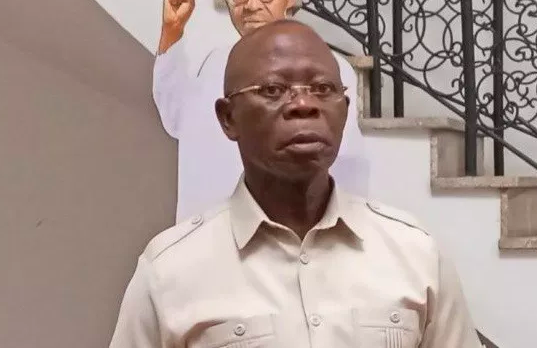
From his role in activism to joining politics, Adams Oshiomhole has been a controversial figure whose profile reeks of the numerous battles he has fought.
As the current Chairman of the ruling All Progressives Congress (APC) celebrates his 68th birthday today, stakeholders in the advocacy and political world, have poured encomiums on Oshiomhole.
However, POLITICS NIGERIA, in this article, reviews the profile of Mr Oshiomhole, who has been at the frontline of different struggles.
Although born on April 4, 1952, Oshiomhole has spent the crucial parts of his life agitating for the demands of workers.
In 1982, Adams was appointed General Secretary of the National Union of Textile Garment and Tailoring Workers of Nigeria, a union with over 75,000 workers.
After democracy was restored in 1999, he became president of the Nigerian Labour Congress and was prominent as the leader of a campaign of industrial action against high oil prices in Nigeria.
Nigerian workers will forever remember Oshiomhole for the negotiation for a raise in the wages of public sector workers.
After former President Olusegun Obasanjo yielded to the 25% increase, he publicly supported Obasanjo and endorsed his candidacy when he was re-elected in 2003.
It was however astonishing that; while the Textile union elected Oshiomhole for a second term as General Secretary, he also continued as the NLC president.
Meanwhile, his relationship with Obasanjo was shortlived as the rise in the price of fuel birthed a protest. Oshiomhole led strikes and demonstrations against the increase.
Media reports have it that he faced arrests, tear gas and temporary blockades of union offices, and Obasanjo introduced legislation to make it more difficult for the NLC to strike.
In fact, on October 9, 2004, the Labour Congress alleged that Oshiomhole was abducted by State Security Services during a protest, but the Nigerian government says he submitted to voluntary custody.
However, the participation of Oshiomhole in struggles was not limited to Nigeria. He was a representative of African Workers for two terms on the Governing Body of the International Labour Organization (ILO), where he served in the committee on Freedom of Association. He was also a member of the Executive Board of the International Confederation of Free Trade Unions.
And then politics…
His records of activism haunted him and pitched him against the then ruling party, Peoples Democratic Party (PDP) when he decided to be involved in politics.
In April 2007, Oshiomhole ran for Governor of Edo State under the Action Congress Party, with which his Labour Party had entered a strategic alliance.
Oserheimen Osunbor of the PDP was declared the winner.
Nonetheless, AC contested the election on the basis of various irregularities. On 20 March 2008, an Edo State election tribunal nullified the election of Oserheimen Osunbor and declared Oshiomhole the winner.
On 11 November 2008, a federal Appeal Court sitting in Benin City upheld the ruling of the state’s elections petitions tribunal, declaring Oshiomole to be the Governor of Edo State. The decision was based on several voting irregularities.
In 2012, he was elected to a second term, winning the elections under the APC.
After Oshiomhole completed his tenure in 2016, Godwin Obaseki, who was a commissioner in his cabinet, succeeded him.
Things, however, went sour when his successor accused him of wanting to play a godfather role in Edo politics. This led to a series of crises in the APC, which brewed factions.
Although Oshiomhole emerged as the national chairman of the All Progressives Congress (APC) in Nigeria following a voice vote by delegates at the party National convention on June 23, 2018, he was suspended from the party after 18 local government chairmen of the party in his native state of Edo passed a vote of no confidence on him.
He was accused of trying to disintegrate the party in Edo State. But a faction of the party loyal to Oshiomhole declared his suspension null and void and then suspended Governor Godwin Obaseki of the state whom they say orchestrated Oshiomhole’s suspension.
Earlier in 2020, Edo APC reaffirmed the suspension of Oshiomhole and said he had no legal right to continue to function as the APC national chairman by the virtue of his suspension in Edo State.
On March 4, 2020, a High Court sitting in Abuja ordered the suspension of Oshiomhole from office of the National Chairman of the APC that having been suspended from the party, Oshiomhole was no longer a member of the party and could not possibly continue to discharge his official responsibilities as national chairman with a clear order of the court that Oshiomhole be restricted to national secretariat of the party.
Some party chieftains, including President Muhammadu Buhari’s cabinet ministers, wanted Oshiomhole removed as the party chair.
Following the intervention of President Buhari and APC national leader, Bola Tinubu, a Federal High Court in Kano gave another judgment which vacated the judgement of the FCT High Court and restored Oshiomhole as the national chairman of APC.
He has then convened peace meetings to settle the party’s internal crisis.
